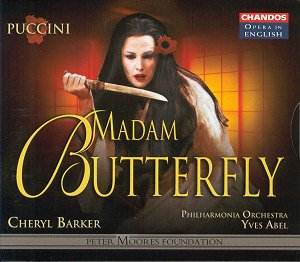As one who speaks Puccini’s native Italian every day
of his life I was inclined to be a bit sniffy about this at first, and
on principle I do feel that operas should be performed in their original
language. But I still have vivid memories of my early encounters with
opera, thanks to the "Opera for All" company that toured the
provinces with just piano accompaniment and everything sung in English.
I remember in particular a "Figaro" and a "Traviata"
and an "Italian Girl in Algiers", and I wonder what I would
have made of them if, as a young boy barely in my teens, I had seen
them instead in a big opera house in a language I didn’t understand.
So maybe the case is not so clear-cut after all, though I have to say
I remember from a few years later a "Twilight of the Gods"
from the ENO on tour (or maybe it was still the Sadler’s Wells at the
time) in which the only word I understood from beginning to end was
"Brunnhilde" (Goodall wasn’t the conductor).
Blood is thicker than water, they say, and somehow
I found it both a moving and an involving experience to hear the opera
in my own language, not least because it is so well and so believably
done.
From the start it was evident that it was going to
be exceptionally well conducted. Abel (a Canadian whom I had not heard
before but who we will surely hear plenty of in the future) manages
to keep the fullest textures light and transparent, but with power when
needed. He knows how to sink into a Puccinian melody, how to bring out
Puccini’s sweetness without indulging it, and above all how to catch
the ebb and flow of Puccini’s tensions, so that the music somehow envelops
the listener. I haven’t heard Puccini-conducting like this since Gavazzeni
laid down his baton.
The singers are united in apparently setting aside
memories of the opera in its original language and singing it as if
it had been written like this. Words and phrases are ideally weighted
and phrased so as to convey both meaning and character. The first to
impress me was Gregory Yurisch (who sounds as much of a native English
speaker as the rest), a rich-voiced Sharpless. Paul Charles Clarke is
a pure tenor, without that baritonal support favoured by the majority
of Italianate tenors today (more of a first-period Carreras than a Domingo,
shall we say). Though his timbre sometimes seemed a little thin it never
lacks quality and he finds power too, and even convinces us that he
feels a modicum of regret at the revolting thing he has done.
Cheryl Barker’s voice has an almost mezzo quality in
the lower range which made her seem a little old-sounding at first,
and some of her vibrato on the high notes seemed to be heading towards
the squally (this again near the beginning). But her "Un bel dì"
(sorry, "One fine day") is most beautifully sung and expressed,
and thereafter she held me effortlessly, for she shows great involvement
and sympathy for both Butterfly’s wretched plight and also for her fierce
native pride. This is a real dramatic portrayal, no mere sing-through.
Jean Rigby is a fairly heavy-toned mezzo, but again,
she makes the most of her dramatic moments in the last act. All the
smaller parts make their mark.
This is opera in English at its best, a real team production
which goes beyond the sum of its parts to show that a clutch of international
stars is not the only, or even the best, way to produce a truthful and
dramatic evening at the theatre. In place of their usually rather reverberant,
brassy sound, Chandos have provided a recording of great refinement
though you need to play it as loudly as you dare to get a really full
body to the big moments. A libretto in English is provided and, disarmingly,
the notes and synopsis are translated into French, German and even Italian,
though anticipated sales of Puccini in English to native Italians must
be fairly small. Yet in all truth they could do far worse. Only the
very elite of the "authentic" Butterflies can actually boast
a finer overall performance.
Christopher Howell

![]() Cheryl Barker (Cio-Cio-San),
Jean Rigby (Suzuki), Paul Charles Clarke (Pinkerton), Gregory Yurisch
(Sharpless), Stuart Kale (Goro), Geoffrey Mitchell Choir, Philharmonia
Orchestra/Yves Abel
Cheryl Barker (Cio-Cio-San),
Jean Rigby (Suzuki), Paul Charles Clarke (Pinkerton), Gregory Yurisch
(Sharpless), Stuart Kale (Goro), Geoffrey Mitchell Choir, Philharmonia
Orchestra/Yves Abel ![]() CHANDOS CHAN 3070 (2)
[2 CDs, 64’37", 72’33"]
CHANDOS CHAN 3070 (2)
[2 CDs, 64’37", 72’33"]